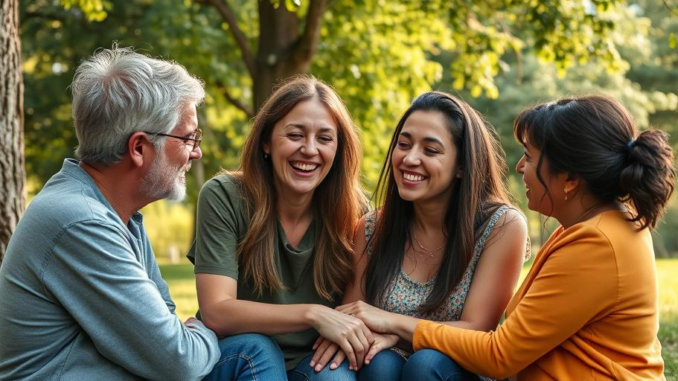
Summary
This article explores the importance of friendships in addiction recovery, offering a guide to building a supportive network. It discusses the benefits of sober friendships, how to make new connections, and maintaining balance with existing relationships. The article emphasizes the role of friends in providing emotional support, accountability, and a sense of belonging, crucial for long-term sobriety.
** Main Story**
Friendship After Addiction: Building Your Tribe
Recovering from addiction? That’s seriously commendable, it’s a tough road but incredibly worth it. And let’s be real, it’s not a solo mission. One of the biggest factors in staying on track is building a solid support system. Friendships, genuine and supportive ones, are absolutely key to that.
Think of this article as your friendly guide to understanding why these friendships matter so much, and how to actually build and nurture them.
Why Sober Friends Are More Than Just Buddies
Sober friendships bring something really special to the table. They aren’t just casual acquaintances; they’re a unique source of support, complementing the advice from professionals and the love from your family. Friends who get the challenges of recovery can offer a level of empathy, encouragement, and belonging that’s just… different. And that difference can be make-or-break for long-term sobriety. Here’s why you need these connections:
-
Emotional Lifeline: Let’s face it, recovery isn’t a smooth ride. It’s more like a rollercoaster blindfolded. Sober friends give you a safe space, no judgment, to spill your feelings, your fears, all of it. They’re there to cheer you on during the tough patches and celebrate every single win, big or small. Believe me, that matters.
-
Accountability Partners: Staying sober isn’t a one-time decision; it’s an ongoing commitment. Sober friends can help you stick to your goals, and they can offer gentle nudges, lend an ear when cravings hit, and help you navigate tricky social situations. It’s like having a co-pilot in the cockpit of your life.
-
Shared Experience, Reduced Isolation: Ever feel like nobody understands what you’re going through? Connecting with others who’ve walked a similar path can squash those feelings of isolation. Sharing experiences, swapping coping strategies, it’s all incredibly validating and empowering. You’re not alone, and they get it.
-
Your Relapse Shield: Here’s a statistic for you; studies have actually shown that strong social support networks drastically reduce the risk of relapse. Seriously! Sober friends can act as a buffer against those triggers and temptations, offering you alternative things to do, and they give you a sense of purpose that goes beyond just avoiding substance use.
Building Your New Crew: A Step-by-Step
Okay, so making new friends, especially during recovery, can feel a little daunting. Where do you even start, right? Here’s a guide to help you build your new connections:
-
Remember You’re Awesome: Seriously. You’ve got a lot to offer in a friendship. Focus on your strengths, your interests, what makes you you. That will pump up your confidence and make you more approachable. People are drawn to authenticity.
-
Be Real, Be Open: Authenticity is like the superglue of genuine connections. Be upfront about your journey, but don’t make it your whole identity. Share other aspects of yourself, your passions, your quirks. This breeds trust and understanding.
Where to Find Your People: Expanding That Circle
-
Support Groups: Seriously, hit up those 12-step meetings (like AA or NA) or other support groups. They’re a safe haven to connect with people who really get what you’re going through. And you might just find some amazing friends there.
-
Recovery Aftercare Programs: A lot of treatment centers offer aftercare programs that include social activities and group therapy. It’s a built-in opportunity to connect with fellow program grads.
-
Sober Fun: Scope out sober social events in your community – sober dances, concerts, movie nights, you name it. It’s a fun, safe way to meet new people without the whole alcohol/drug scene.
-
Shared Passions: Join clubs, classes, groups – hiking, art, book clubs, whatever floats your boat! It’s a natural way to connect with like-minded people.
-
Online Communities: Don’t underestimate the power of online recovery forums or social media groups. You can connect with a wider net of people, and find support and encouragement whenever you need it. I know some people are wary about online friendships, and they certainly shouldn’t be the only friendships you have, but it can be a great place to find support.
Navigating Old Friendships
Now, navigating friendships with people who aren’t in recovery can be a bit of a tightrope walk. How do you balance it all? Here’s how to strike that balance:
-
Honest Talk: Be upfront with your old friends about your recovery and the changes you’re making. And be upfront about what you expect from them as friends; you need a sober environment, for one.
-
Activity Selection: Suggest activities that don’t revolve around alcohol or drugs. Movies, hikes, dinner, you name it. You might be surprised how many friends are up for that
-
Know When to Distance: And listen, if some friendships are just dragging you down, it’s okay to create some space. Your sobriety is priority number one. Surround yourself with people who lift you up, not bring you down.
Building a supportive network is a journey, not a destination. Be patient with yourself. Embrace new experiences. Real connections take time. But with the right support, you can rock your recovery and create a life that’s fulfilling, happy, and free from addiction. And isn’t that what it’s all about?
One last thing. Don’t be afraid to be that friend. The one who checks in, the one who celebrates the small victories, the one who simply listens. It’s amazing how much you can gain by being a good friend to others. I think its so important!


Be the first to comment